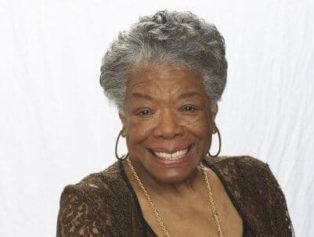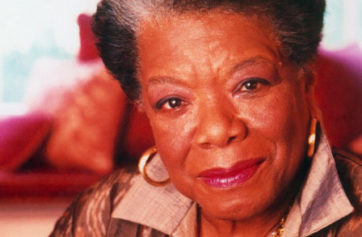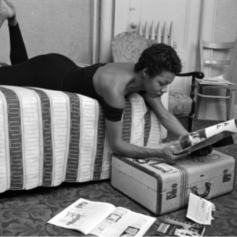With the death today of Maya Angelou at age 86 in North Carolina, America has lost one of its most influential voices and powerful minds of the 20th century.
While many tributes to her will focus on her distinction as the first African-American female writer to become celebrated by American popular culture, Angelou’s gifts place her in the pantheon of great American men and women of letters such as Norman Mailer, William Faulkner, Pearl Buck and Emily Dickinson.
Her searing, brutally honest and deeply affecting series of seven autobiographies, starting with “I Know Why the Caged Bird Sings”—books that ultimately changed the way we look at the memoir—gave a voice to the pain of Black men and women enduring and surviving the wages of American apartheid. In this way, by providing several generations of Black people with a framework to consider their place in the world and the strength of their spirit, Angelou effectively altered the emotional evolution of the African-American community and thus the nation.
Her books provided our people with a set of instructions on how to bear the everyday pain of being American and Black.
The New York Times called Angelou a chronicler of the nastiness of the Jim Crow South where she spent much of her early and later years. But Angelou’s work touched Black people in every corner of the country because her words spoke to our struggles whether our ZIP code happened to be in Arkansas or Massachusetts.
It is nearly impossible to comprehend the breadth of accomplishments and experiences that Angelou crammed into her 86 years. Just a few of them would be considered a stunning lifetime of achievement for the rest of us mere mortals.
She formed a dance troupe with Alvin Ailey in the 1950s, called “Al and Rita” (she was born in St. Louis with the name Marguerite Johnson), performing primarily around San Francisco. Before she began dancing, she was actually the first Black female streetcar conductor in San Francisco. In 1957, she recorded her first album, singing calypso — but three years later was working with Dr. Martin Luther King Jr. as the Northern coordinator of the Southern Christian Leadership Conference.
By the mid-1960s she had moved to Ghana, where she was an administrator at the University of Ghana and became a close friend of Malcolm X while he was visiting Accra. She moved back to the U.S. in 1965 to help him build a new civil rights group, the Organization of Afro-American Unity, just before he was assassinated.
In 1968, devastated by the assassination of King on her 40th birthday — while she was actually in the midst of organizing a march at his request — Angelou wrote, produced, and narrated a 10-part documentary called “Blacks, Blues, Black!” on the connection between African-Americans and the blues, which aired on National Educational Television, the precursor to PBS.
This was also the year she attended a dinner party with her close friend author James Baldwin when Random House editor Robert Loomis challenged her to write an autobiography. The challenge resulted in “I Know Why the Caged Bird Sings,” which was published in 1969 and became the most famous work of her long life.
She followed up that book by writing the film Georgia, Georgia, which is noted as the first screenplay written by a Black woman, released in 1972. Angelou went on to work as a composer, writing for singer Roberta Flack and composing movie scores, in addition to writing articles, short stories, TV scripts and documentaries, autobiographies and poetry, producing plays, and teaching at several colleges and universities.
As an actress she was nominated for a Tony Award in 1973 for her role in Look Away, and she had a supporting role in the television miniseries Roots.
During this time she struck up a friendship with media powerhouse Oprah Winfrey and the two developed a deep bond that blossomed over the next 40 years.
Angelou became a well-known figure to white Americans in 1993, when President Bill Clinton asked her to read a poem at his inauguration. Her recitation of “On the Pulse of Morning”— the first poet to make an inaugural recitation since Robert Frost at John F. Kennedy’s inauguration in 1961—won a Grammy Award.
But Angelou wasn’t even close to being done. In 1996 she directed a Hollywood feature film, Down in the Delta, starring Alfre Woodard and Wesley Snipes.
Last year Angelou, who in recent years had been teaching at Wake Forest University in Winston-Salem, N.C., and giving speeches around the world, published the seventh autobiography in her series, “Mom & Me & Mom,” focusing on her relationship with her mother.
She finally succumbed to an undisclosed illness early this morning. But the tones of her deep, soothing voice, her incredibly lyrical language, and the earth-shattering power of her mind will never leave us.


